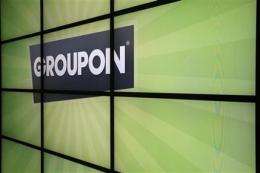Groupon's shares fall below IPO price in 3 weeks

Groupon Inc.'s stock fell below its initial public offering price for the first time Wednesday as investors reassess the challenges facing the still-unprofitable online deals company in a shaky economy.
The shares plunged $3.11, or more than 15 percent, to close at $16.96. That's well below Groupon's IPO price of $20, which was set less than three weeks ago.
The rapid fall from Wall Street's graces occurred almost entirely this week. Groupon has shed one-third of its market value since Friday's close to wipe out nearly $6 billion in shareholder wealth.
Political and economic uncertainty is making promising but unproven companies look less appealing.
Congress' inability to reach an agreement on how to reduce the U.S. deficit has raised the specter of automatic cuts and tax increases, which would increase the chances of the economy falling into another recession. That reduces Wall Street's appetite for risky investments such as Groupon, which is facing increasing competition in the rapidly growing niche of online advertising that it pioneered.
The decline also has been deepened by a skeptical class of investors, known as short sellers, who bet that certain stocks are going to slide. They do this by borrowing shares that they immediately sell, hoping they can repay the stock by buying at a cheaper price later.
Groupon gets local merchants to offer steep discounts to large clusters of consumers, a concept that turned it into one of the world's fastest growing companies. Founded in 2008, Groupon is on pace to generate more than $1.5 billion in revenue this year, primarily from commissions it gets from deals sold. Google Inc., which runs the Internet's largest advertising network, had annual revenue of just $86 million at the same stage of its existence.
Unlike Google, though, Groupon has been amassing huge losses as it tries to expand and ward off threats from hordes of copycats. The competition includes Google and another Internet powerhouse, Amazon.com Inc., which is backing a startup deals company called LivingSocial.
Through the first nine months of this year, Groupon lost $308 million, partly because its payroll swelled to more than 10,400 employees to help persuade local merchants to offer deals. Groupon's losses and massive work force provide another stark contrast to how Google went about its business as it was starting out. After three years, Google eked out a $7 million profit and had fewer than 300 employees.
As it prepared its initial public offering of stock, Groupon tried to sugarcoat the losses by emphasizing an accounting approach that securities regulators eventually required the company to abandon.
Meanwhile, some merchants have become increasingly skeptical that partnering with Groupon and similar services is really a deal for them. Groupon takes up to half the price of the coupon, so if an Italian restaurant is offering $50 worth of food for $25, the merchant gets just $12.50. Merchants can make the money back if the coupon draws a customer who keeps returning and brings friends, but some businesses complain that bargain hunters rarely come back after scoring a cheap meal or massage. Other businesses, though, see Groupon as good marketing - a way to reach troves of new, social media-savvy customers who share good deals with friends on Facebook and Twitter.
Despite the red flags hovering over the company, Groupon's rapid growth tantalized enough investors to turn its IPO into a success. After the IPO was priced at $20, the company's stock soared as high as $31.14 in its stock market debut on Nov. 4. All of those gains have evaporated in just 14 trading days.
What's happened to Groupon's stock serves as a cautionary tale to anyone thinking about investing in a hot company in its early stages on the market. The trading in stocks following an IPO is prone to wild swings that can upset portfolios - and investors' stomachs.
Groupon isn't the only example of this volatility. For instance, Internet radio service Pandora Media Inc. went public in June at $16 per share and then saw its stock climb in its debut. The shares closed at $10.51 Wednesday. After online professional networking service LinkedIn Corp. priced its IPO at $45 in May, its shares soared above $100. The stock finished Wednesday at $66.
The see-sawing phenomenon isn't limited to Internet companies. Automobile maker General Motors Co. emerged from bankruptcy protection with an IPO priced at $33 a year ago, and its stock price is now hovering at about $20.
Some IPOs maintain an upward trajectory. Google's stock has never come close to returning to its IPO price of $85 in 2004. A year after Google went public, its stock price stood at $280. On Wednesday, it closed at $570.11.
Groupon, which is based in Chicago, declined to comment on the stock price drop. It is still in a federally mandated "quiet" period that surrounds IPOs.
©2011 The Associated Press. All rights reserved. This material may not be published, broadcast, rewritten or redistributed.




















